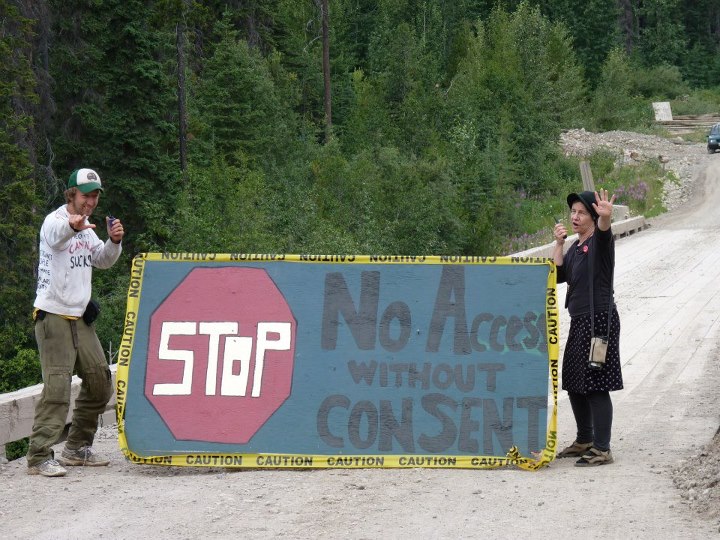If you want to build a pipeline on Unis’tot’en territory, you better ask. The over 150 participants who went to the third annual action camp a few weeks ago, however, were not trying to build a pipeline; but rather were trying to build support and solidarity for communities who will be impacted.
B.C. approved the Pacific Trails Pipeline (PTP) this past April to be built through the territory on which the Unis’tot’en clan of the Wet’suwet’en Nation has been hunting and fishing since time immemorial. They have never ceded nor surrendered their territories through the treaty process and thus assert that neither B.C. nor the government have the right to approve industrial projects happening on their land.
The Unis’tot’en explain on their website:
“In ancient times and even today in canoe journeys, and community resistance building gatherings, there exists Protocols where people show who they are in relation to asking permission to enter the Traditional Lands from the Traditional Chiefs and Matriarchs.
Free Prior and Informed Consent is written into today’s United Nations Declaration of the Rights of Indigenous Peoples. Many sovereigntists take issue with the so called ‘rights’ as they are created by man and not by the Creator.”
This video put out by SubMedia TV shows interviews from members of the Wet’suwet’en Nation as well as organizers and participants of the camp.
The Pacific Trails Pipeline is a natural gas pipeline that would bring natural gas from northeastern B.C. to a Light Natural Gas terminal which is being built in Kitimat, B.C. This would increase tanker traffic in the precarious (due to high winds, extreme weather conditions, and many small islands which leave little room for large tankers to maneuver) Douglas Channel, as well as expand B.C.’s dirty natural gas sector which is largely used to fuel the tar sands. To add fuel to the fire, part of the route of the Enbridge Northern Gateway Pipeline follows the path of the PTP. This means that if the PTP route is clear-cut and becomes accessible to industry, it is easier for companies like Enbridge and others looking to build tar sands pipelines to Kitimat.

The camp brought supporters from a number of First Nations including Secwepmec, Nuu-chah-nulth, as well as Fort Chipeweyan. Supporters also attended from across Canada and the USA, as well as a caravan from Vancouver Island.
The week begun with workshops on decolonization and race relations, which was a large theme of the camp: How can settler communities and allies work together to fight these projects and Harper’s colonial agenda to expand the tar sands and tar sands projects (associated pipelines and tanker projects) without the free, prior, and informed consent of Indigenous peoples? Organizers and allies of the camp said that there would be uncompromising resistance from both Indigenous and non-Indigenous communities working in solidarity. The large attendance and support for the community was a testament of exactly that.
There were also workshops on traditional medicines, de-escalation, campaign strategy, as well as a Council of Canadians’ System Change, Not Climate Change Project.
While PTP is a natural gas pipeline, the project is connected with other energy privatization schemes and the expansion of Canada’s fossil fuel industry (oil and gas), all of which undermines Canada’s ability or political will to take action on climate change. More articles about the camp and recent articles about the Pacific Trails Pipeline:
SubMedia TV video
Blog about the camp: Tarsands Pipelines, Site C, Pacific Trails Pipeline, Fracking, and the stand against them.
Common Sense Canadian: LNG, Fracking and Site C Dam: BC’s Looming Energy Boondoggle
Huffington Post BC article: Little Known Pipeline Paves Way for Enbridge Under Radar of British Columbians
Interview with Terra Informa and Hereditary Chief Toghestiy of the Wet’suwet’en



